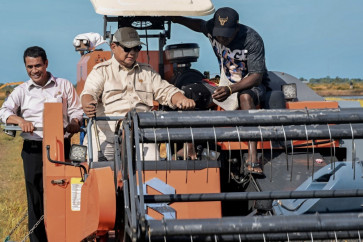Popular Reads
Top Results
Can't find what you're looking for?
View all search resultsPopular Reads
Top Results
Can't find what you're looking for?
View all search resultsCoral reefs in Bulukumba threatened by sea temperature
White coral: The sea temperature has led to coral reef bleaching in waters around Liukang Island, Bulukumba, South Sulawesi
Change text size
Gift Premium Articles
to Anyone
W
span class="caption">White coral: The sea temperature has led to coral reef bleaching in waters around Liukang Island, Bulukumba, South Sulawesi. (Courtesy of the Marine Science Diving Club of the University of Hasanuddin)
The increase in sea temperature over the last two weeks has bleached the coral reef in waters around Bulukumba regency in South Sulawesi, threatening a massive reef decline.
'Currently, more than 50 percent of the coral located in Bulukumba waters have turned white,' said Nirwan Dessibali, team coordinator of the Marine Science Diving Club at the University of Hasanuddin (MSDC Unhas) Makassar in South Sulawesi.
Nirwan said a team of five students from the Unhas School of Maritime Affairs and Fisheries discovered the bleached coral during a surveillance operation in waters around Tanjung Bira and Liukang Loe Island, Bulukumba, last week. They monitored the temperature of the water for four days, a process which had involved team members diving to depths of between three to 10 meters.
Nirwan said that during the monitoring, the sea surface temperature had reached 30'C, higher than the average temperature of 27'C.
He said MSDC Unhas carried out the monitoring activities as a response to information released by the National Ocean Atmospheric Administration (NOAA), which announced that the sea temperature across half of the archipelago would continue to increase, surpassing the average temperature levels starting from the middle of this year. The Makassar Strait was said to be among areas that would be affected by the increase to sea temperature, in which the highest rise is predicted to be in the waters around Raja Ampat in Papua.
Apart from Bulukumba, MSDC Unhas had also monitored waters around the Spermonde group of islands near Makassar, such as the Samalona and Baranglompo islands. Coral in several areas around the islands had turned white.
Nirwan said the coral reef had turned white because their coral polyps had lost its zooxanthellae algae symbiotic due to the increase in the sea temperature.
He said the increases of sea temperature would continue to occur through the middle of this year and emphasized that those coral reefs which had turned white might die.
'The massive die off will threaten the sustainability of the ecosystem in the coral reefs, especially the sea biota. They will lose homes they need to cultivate,' said Nirwan.
A coral reef expert from the Unhas School of Maritime Affairs and Fisheries, Chair Rani, said that a massive die off would occur if the high sea temperatures continued over the next two weeks.
'We hope that the increase in sea temperature, influenced by trans-Pacific currents, will not continue for much longer,' said Chair.
Studies show that 40 percent of coral reefs in Bulukumba have suffered serious damage, while in South Sulawesi, the damage level has reached 40-70 percent. Illegal fishing practices using home-made bombs, anesthetic agents and trawls as well as sea pollution are among the major causes behind the damage to the coral reefs in the area. (ebf)










